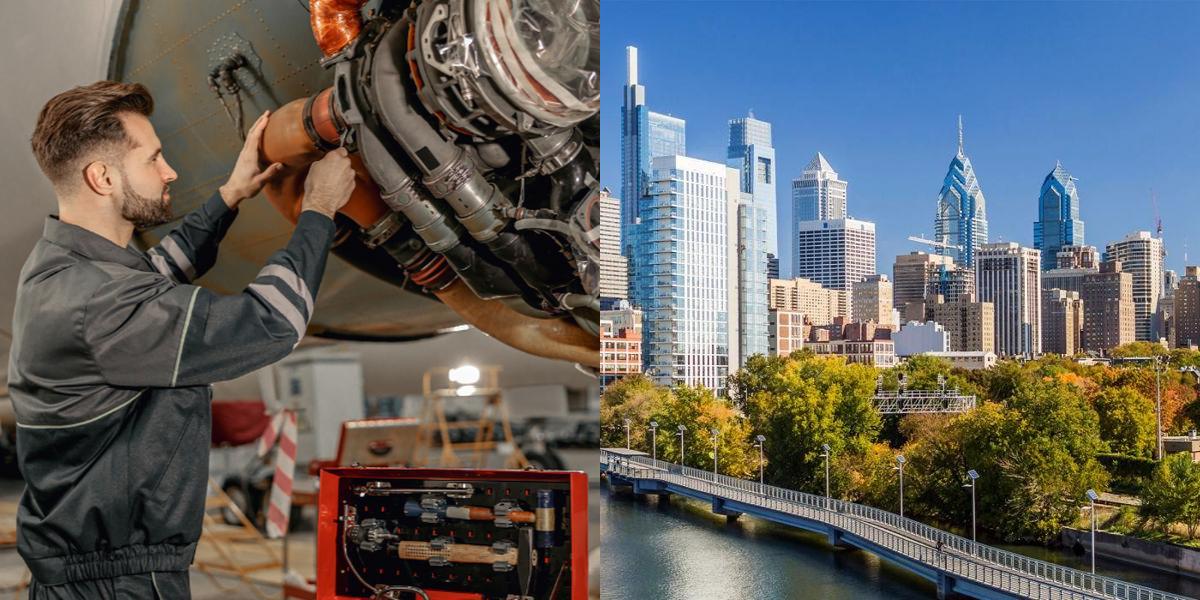How to Become an Aviation Mechanic in Pennsylvania

What is an Aviation Mechanic?
Aviation mechanics, also known as aircraft mechanics or aviation maintenance technicians, are professionals responsible for inspecting, repairing, and maintaining aircraft. They ensure that aircraft are safe to fly by conducting routine inspections, troubleshooting mechanical issues, and performing necessary repairs and replacements.
The responsibilities of an aviation mechanic include:
- Conducting routine inspections and maintenance checks on aircraft systems, such as engines, landing gear, and electrical systems.
- Troubleshooting and diagnosing mechanical problems.
- Repairing or replacing faulty components and parts.
- Performing scheduled maintenance tasks, including oil changes and engine tune-ups.
- Keeping detailed records of inspections, repairs, and maintenance activities.
4. Consider Apprenticeship or Entry-level Positions
Starting as an apprentice or in an entry-level position can provide you with valuable hands-on experience and further develop your skills as an aviation mechanic. Look for companies that offer apprenticeship programs or entry-level positions for recent graduates. These positions can serve as stepping stones to more advanced roles in the future.
5. Prepare for Interviews
Once you start receiving interview invitations, it's important to prepare for them. Research the company and familiarize yourself with their operations, values, and any recent news or developments. Practice common interview questions and prepare examples of how your skills and experience make you a good fit for the position.
6. Continue Learning and Developing Your Skills
The aviation industry is constantly evolving, and it's important to stay up-to-date with the latest advancements and regulations. Attend workshops, seminars, or training programs to expand your knowledge and skills. Consider pursuing additional certifications or specializations to enhance your career prospects.
Remember, landing your first job as an aviation mechanic may take time and effort. Stay persistent, keep improving your skills, and take advantage of any opportunities that come your way. With dedication and a strong work ethic, you can build a successful career in aviation maintenance.
Career Paths and Opportunities after Becoming an Aviation Mechanic
Becoming an aviation mechanic opens up a wide range of career paths and opportunities within the aviation industry. Here are some potential career paths you can explore:
1. Airline Maintenance
Many aviation mechanics find employment with airlines, where they are responsible for the maintenance, repair, and inspection of the airline's fleet. Airline maintenance departments can offer stable employment, competitive salaries, and opportunities for career advancement.
2. Aircraft Manufacturing
Another career path is working for aircraft manufacturers. In this role, you would be involved in the assembly, testing, and quality control of new aircraft. This can be a rewarding career choice for those who enjoy working with the latest technologies and being at the forefront of aircraft innovation.
3. General Aviation
General aviation refers to non-commercial aviation activities, such as private flying, charter services, and flight schools. Many aviation mechanics find employment in general aviation, where they work on a variety of aircraft types and provide maintenance services to private owners and operators.
4. Government and Military
Government agencies and the military also employ aviation mechanics to ensure the safety and reliability of their aircraft. These positions often require additional security clearances and specialized training due to the sensitive nature of the work.
5. Maintenance and Repair Facilities
Maintenance and repair facilities, also known as repair stations, provide maintenance services to various customers, including airlines, private owners, and leasing companies. Working in a repair station can offer exposure to a wide range of aircraft models and systems, making it an excellent opportunity to expand your knowledge and skills.
6. Consulting and Inspections
Experienced aviation mechanics may choose to work as consultants or inspectors, providing expertise and guidance to aviation companies. This can involve conducting inspections, audits, or evaluations to ensure compliance with regulations and industry standards.
7. Teaching and Training
For those who enjoy sharing their knowledge and skills, a career in teaching or training may be a good fit. Many aviation mechanics go on to become instructors at aviation maintenance schools or provide training to new mechanics entering the field.
These are just a few examples of the career paths and opportunities available to aviation mechanics. The aviation industry is diverse and constantly evolving, providing ample room for growth and exploration. With experience and continuous learning, you can carve out a successful and fulfilling career in aviation maintenance.
Final Thoughts
Becoming a certified aviation mechanic requires a combination of education, training, and certification. By following the steps outlined in this guide, you can set yourself on the path to a rewarding career in aviation maintenance. Remember to stay dedicated, continue learning and developing your skills, and take advantage of networking opportunities within the industry. With determination and a passion for aviation, you can achieve your goal of becoming an aviation mechanic and enjoy a fulfilling career in the aviation industry.
Looking for a better fit? These other articles could be more in line with your expectations if this one isn't precisely what you had in mind:

Blessed Joy Amarga is part of the Growth and Sales teams at Dreambound. She helps bring in new leads, increasing the number of people at the top of the sales funnel, and supporting the team in creating graphics to boost social media engagement. Blessed is also a Licensed Architect. Outside work, she enjoys traveling and exploring new places for her vlog.



